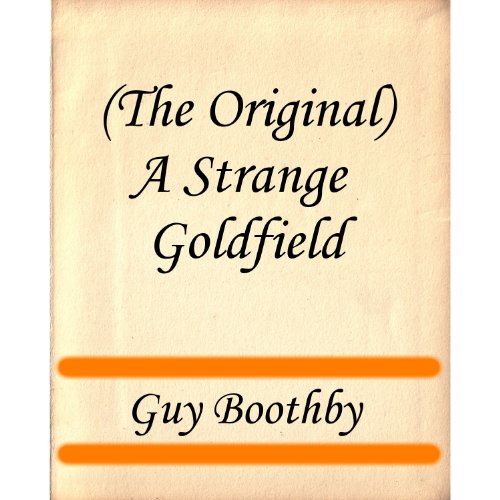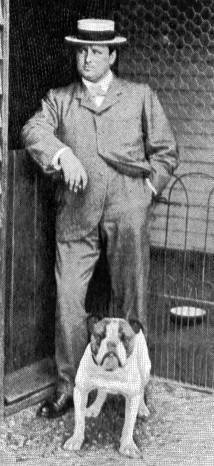
Of course nine out of every ten intelligent persons will refuse to believe that there could be a grain of truth in the story I am now going to tell you. The tenth may have some small faith in my veracity, but what I think of his intelligence I am going to keep to myself. In a certain portion of a certain Australian Colony two miners, when out prospecting in what was then, as now, one of the dreariest parts of the Island Continent, chanced upon a rich find. They applied to Government for the usual reward, and in less than a month three thousand people were settled on the Field. What privations they had to go through to get there, and the miseries they had to endure when they did reach their journey's end, have only a remote bearing on this story, but they would make a big book. I should explain that between Railhead and the Field was a stretch of country some three hundred miles in extent. It was badly watered, vilely grassed, and execrably timbered. What was even worse, a considerable portion of it was made up of red sand, and everybody who has been compelled to travel over that knows what it means. Yet these enthusiastic seekers after wealth pushed on, some on horseback, some in bullock waggons, but the majority travelled on foot; the graves, and the skeletons of cattle belonging to those who had preceded them punctuating the route, and telling them what they might expect as they advanced. That the Field did not prove a success is now a matter of history, but that same history, if you read between the lines, gives one some notion of what the life must have been like while it lasted. The water supply was entirely insufficient, provisions were bad and ruinously expensive; the men themselves were, as a rule, the roughest of the rough, while the less said about the majority of the women the better. Then typhoid stepped in and stalked like the Destroying Angel through the camp. Its inhabitants went down like sheep in a drought, and for the most part rose no more. Where there had been a lust of gold there was now panic, terror—every man feared that he might be the next to be attacked, and it was only the knowledge of those terrible three hundred miles that separated them from civilisation that kept many of them on the Field. The most thickly populated part was now the cemetery. Drink was the only solace, and under its influence such scenes were enacted as I dare not describe. As they heard of fresh deaths, men shook their fists at Heaven, and cursed the day when they first saw pick or shovel. Some, bolder than the rest, cleared out just as they stood; a few eventually reached civilisation, others perished in the desert. At last the Field was declared abandoned, and the dead were left to take their last long sleep, undisturbed by the clank of windlass or the blow of pick. More Other Books by Guy Boothby by ADB Publishing (The Original) A Professor of Egyptology (The Original) A Strange Goldfield (This Book) (The Original) In Strange Company (The Original) Pharos the Egyptian (The Original) The Duchess of Wiltshire’s Diamonds (The Original) The Race of Life (The Original) A Bid for Fortune or Dr Nikola's Vendetta (The Original). Nikola Returns (The Original) Dr. Nikola's Experiment (The Original) Farewell, Nikola (The Original) The Lust of Hate
Author

Guy Newell Boothby was born in Adelaide, South Australia, the son of Thomas Wilde Boothby, a Member of the South Australian House of Assembly. At six years of age he travelled with his mother to England and was educated at Lord Weymouth's Grammar School, Salisbury and at Christ's Hospital, London between 1874 and 1883. When his education was over he returned to Australia where he eventually became secretary to the Mayor of Adelaide, Lewis Cohen. He was dissatisfied with his prospects in Adelaide and consequently he moved to Brisbane where he hoped his prospects would be better. In the meantime he wrote a series of comic operas and plays, all of which were relatively unsuccessful. He was of a roving disposition and at age 24 he travelled across Australia from north to south and later he travelled extensively in the East. By 1894 he had married Rose Alice Bristowe and he and his wife moved to England in that year, which was notable for the publication of his first book, 'On the Wallaby, or, Through the East and Across Australia', an account of his and his brother's travels in Australia. He was given advice and encouragement in his writing by none other than Rudyard Kipling and the year 1895 saw the publication of three novels, the most significant of which was 'A Bid for Fortune: or, Dr Nikola's Vendetta'. This introduced probably his best known character, Dr Nikola, a ruthless, unscrupulous figure, with his ubiquitous large cat, who was to feature in five of his novels over the ensuing years. The book was an instant success and brought him a certain amount of fame. Dr Nikola had first appeared in serial form in the Windosr Magazine. Over the next 10 years he was to write another 50 books and a further five were published posthumously, the last of which was 'In the Power of the Sultan' (1908). He was so prodigious that the story circulated that he spoke his tales into a phonograph, from which they were later transcribed by secretaries. He is perhaps remembered also for introducing one of the early gentlemen crooks of literature when he featured Simon Carne in 'A Prince of Swindlers' in 1897. Carne had originally appeared in Pearson's Magazine and as a gentleman crook he pre-dated another of his kind in A J Raffles by two years. Boothby's novels were often set in Australia (not surprisingly) and were classed as 'fast-paced thrillers' although some felt that although exciting in plot they were 'hastily and carelessly written'. In addition they were said to have been enjoyed by those who 'care for frank sensationalism carried to its furtherest limits'. Despite these comments his books were extremely popular and made him one of the most successful novelists of his day. Boothby, who was also a successful breeder of prize dogs, died suddenly of pneumonia at his home, Winsley Lodge, Watkin Road, Bournemouth in 1905. He left a widow and three children. Gerry Wolstenholme February 2012